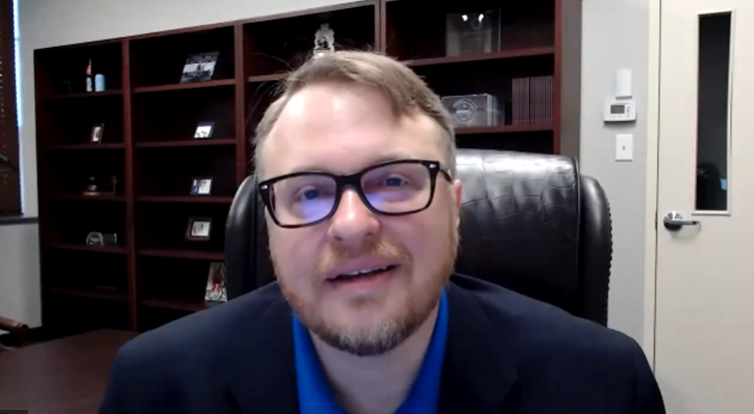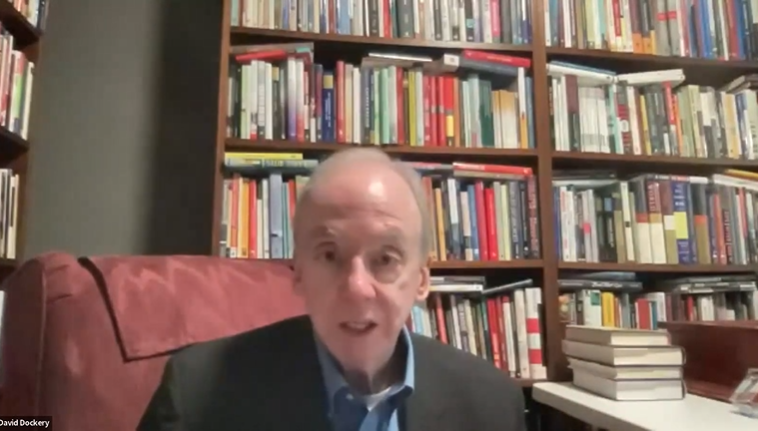Two respected professors from Southeast Baptist Theological Seminary gave lectures on evangelism and Christian education at the 2023 Global Missionary Mobilization Conference in memory of Dr. Nelson Bell.
Held by the China Servant Leadership Center and the Global Servant Leadership Revival Platform, the international conference featured topics such as theological higher education, senior missions, digital mission ministry, the medical mission field, and the Israeli frontier.
“He has used people all over the world to share his good news,” said Dr. Matt Queen, Provost of Southeast Baptist Theological Seminary, on April 21st, the second day of the 2023 Global Missionary Conference.
As a professor of evangelism, Dr. Queen encouraged Christians to use “the parable of the sower” to evaluate the strategies and results of evangelism.
In the metaphor, there are four different soil fields leading to four different results. “It is only when someone is exposed to the seed that they know what type of soil they are in. If we are not preaching the gospel to people, they don’t have any way to judge who they are.” Quoting from Stiff Smith, a pastor, and his friend, the provost said that we Christians should believe in the frequency of telling the gospel and have complete faith in the seed rather than rely on our prejudgment about the soil and anticipation of the response.
He then explained the four truths taught by Jesus Christ in the Parable of the Sower.
First, the seeds fell along the path, which means that upon hearing the gospel, those who do not understand it will fully dismiss it. Dr. Matt said, “When you share the gospel and someone just dismisses it, don’t feel that you were a failure.”
Second, the seeds that fell on the rocky ground illustrate individuals who initially accept the gospel superficially. However, if they embrace Jesus in this manner, they will quickly abandon their faith when faced with challenges. Dr. Queen encouraged Christians to recognize that such outcomes were not their fault. “When you share the gospel and someone does that to you, make sure you follow up as much as you can, but realize this will be a response to the gospel,” he explained.
Third, the seeds that fell among thorns teach us that when we engage in evangelism, some individuals will readily accept the message. Nevertheless, when confronted with the cares and allurements of life, they will reject the gospel, becoming unproductive in their faith.
The fourth type of soil signifies that the gospel will never fail, and those who receive it will reproduce it.
“Please take courage from what Jesus told us today. Not every time you share the gospel, people will come to Jesus,” Dr. Matt encouraged. “If we share the gospel and someone rejects it, they are responsible; if we share the gospel and someone receives it, God’s responsible; but if the people we come into contact with, the people we know, don’t ever share the gospel, then we are responsible. We are responsible because we never encourage them to share it, and we don’t take the time to share the gospel.”
Then Dr. David Dockery, President of Southeast Baptist Theological Seminary, delivered a speech on global missionary strategies by connecting Christian education to the mission world in the 21st century.
Inspired by the story of William Carey, the father of modern missions, Dr. Dockery said that we should learn two primary lessons from his life: first, he believes that we need to bring the gospel around the world; second, he emphasizes that God uses means to accomplish the spread of the gospel.
“We must recognize that God desires us to do a new work.” Dr. Dockery said we face different tasks and challenges in this multi-racial, multi-color, and multicultural world. “We need to see the great opportunity that God has given to us for the advance of His kingdom. There are grand opportunities and grand responsibilities.”
To respond to God’s calling in a contemporary global context, the president shared five suggestions that all missionaries should remember.
First, we should remind ourselves of the incredible changes in our current global context.
Second, he urged Christians to recognize the importance of tolerance while rejecting the pressure to adopt a stance of religious pluralism, which undermines the uniqueness of the gospel message.
The third suggestion was to rethink the role of Christian education in establishing a Christian presence in significant settings around the globe for the purpose of evangelism and pre-evangelism.
Fourth, we need to realize the shift that is taking place in demographics and the expansion of Christians in Asia and the Southern Hemisphere.
He then advised the participants to reconsider the need to expand Christian education‘s international committees to include intercultural opportunities.
He then emphasized, “Christian education around the world today can be a cooperative agent in the 21st century and a means to advance the gospel.” Educators should take the responsibility to dispel misconceptions, explain biblical justice in an unjust world context, build ongoing relationships among unreached areas, and develop global Christians. In this way, Christian education could be like a candle in a dark room, with a warm light that is not aggressive but attractive to the people in the darkness.
Dr. Dockery finally exhorted, “Do not avoid this calling; let us bring education and missions together; let us expect great things from God while attempting great things for God. Let us go forth with wisdom, humility, and confidence. Recognizing that unique calling is ours, we are ready to provide an answer for the hope that is in us through Jesus Christ our Lord.”













